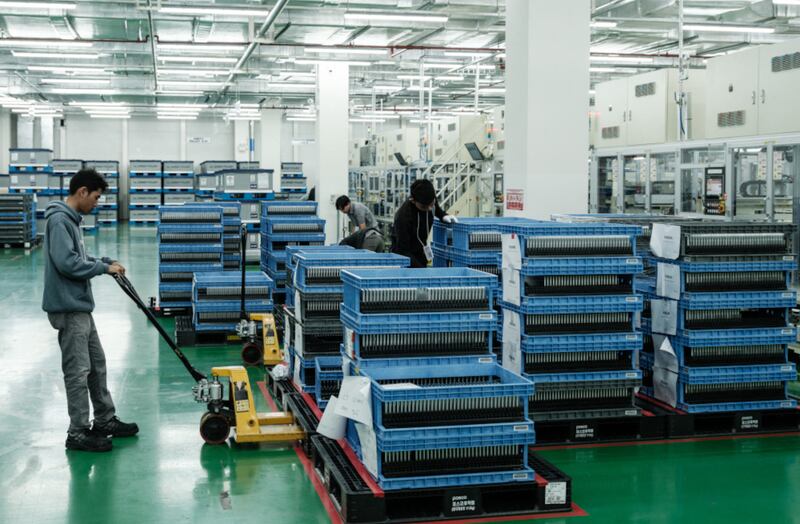On the streets of Jakarta and other major Indonesian cities, Chinese electric vehicles (EVs) are becoming a familiar sight – a sign of their growing appeal in Southeast Asia’s largest auto market.
Chinese brands including Wuling, BYD and Chery are making inroads into Indonesia's auto industry by offering affordability, cutting-edge technology and design, challenging Japanese stalwarts such as Toyota, Honda and Mitsubishi.
Indonesia’s EV infrastructure – including charging stations – remains underdeveloped, but the country’s upper-middle class is not daunted by such challenges, said Syakur Usman, an automotive observer and author of The Automotive Industry in Indonesia.
“These are global-minded consumers who frequently travel abroad and are already familiar with EVs,” he said.
Though electric vehicles account for just 5% of Indonesia’s total car sales this year so far, analysts see vast potential in a market of over 270 million people where environmental awareness is on the rise.
“Public acceptance of EVs is steadily increasing,” said Muhammad Nur Yuniarto, executive director of the Automotive Control System Center at the Sepuluh Nopember Institute of Technology in Surabaya.
“Initially, there were concerns about battery durability and reliability, but these have been dispelled as EVs have proven reliable and safe for daily use,” he told BenarNews.
RELATED STORIES
[ Chinese carmakers edge ahead in Indonesian electric vehicle marketOpens in new window ]
[ Report: EV battery making riddled with rights violations, environmental threatsOpens in new window ]
[ Indonesia to give consumers, manufacturers subsidies for electric carsOpens in new window ]
[ Economic woes, electric vehicle aspirations jolt Thailand’s prized auto industryOpens in new window ]
While Toyota and Daihatsu still hold the top spots, Chinese sales are increasing.
BYD has sold over 11,000 vehicles in Indonesia since deliveries began in July. It rose to sixth place in October, with sales that month reaching 2,488 units, according to data from the Indonesian Automotive Industry Association (Gaikindo). Meanwhile, Wuling Motors reported selling 9,000 EVs in 2023.
“BYD’s success in Indonesia as a market leader is a testament to our commitment to providing high-quality, affordable electric vehicles that meet the needs and preferences of Indonesian consumers,” Eagle Zhao, president director of BYD Motor Indonesia, said in a statement last month.
The resurgence of Chinese automakers is striking given their rocky start in Indonesia. Early entries in the 2000s struggled with perceptions of poor quality, causing brands such as Chery and Geely to withdraw.

But by 2017, companies including Wuling Motors had returned, making local investments including a U.S. $700 million factory near Jakarta.
BYD, meanwhile, is building a $1.3 billion factory in West Java, which is expected to produce 150,000 vehicles annually.
In addition, Chinese manufacturers have benefited from government incentives aimed at boosting EV adoption. Policies introduced in 2023, including reduced luxury taxes and import duties, have made EVs more accessible.
Chinese automakers now command an 80% share of Indonesia’s EV market.
This year, the government issued a regulation exempting import duties on completely constructed electric vehicles, spurring a 347% increase in imports, according to Gaikindo.
Domestic parts requirements
To boost local manufacturing, the government has ordered that 40% of EV parts be domestically produced by 2026 and 80% by 2030.
Officials said this shift is crucial to developing Indonesia’s domestic EV ecosystem, creating jobs and growing the local economy.
Syakur, the automotive observer, said Chinese companies had leveraged their extensive manufacturing capabilities to dominate the still developing EV industry in Indonesia.
“They aren’t held back by legacy technologies or hesitation,” Syakur told BenarNews, contrasting this with the approach of Japanese brands, which have been slower to embrace EVs.
Japanese brands including Toyota and Honda continue to focus on conventional and hybrid vehicles that combine internal combustion engines with batteries.
Last month, a Toyota official said the company is focusing on hybrid vehicles in Indonesia. According to him, consumers preferred hybrids over battery electric vehicles.
“Hybrid vehicles are a vital stepping stone in the transition to electrification,” said Bob Azam, deputy president director of PT Toyota Motor Manufacturing Indonesia.
“They need support to help bridge the gap between conventional cars and fully electric models,” he added.
In 2025, the government is planning a set of tax incentives with a particular focus on hybrid and other types of vehicles, Industry Minister Agus Gumiwang Kartasasmita said Friday.
“For example, we recently discussed incentives or stimulus for the automotive sector,” Agus told reporters.
“Policies such as luxury goods sales tax and VAT exemptions will be applied not only for electric vehicles but also for hybrids and other types.”
Groups like the NGO Walhi have argued that measures to promote EVs such as subsidies and tax incentives fail to address the broader sources of the environmental crisis, including the continued use of coal-fired power plants, industrial emissions and waste-burning practices.
The focus on EVs also overlooks impactful solutions such as improving public transportation systems.
Competitive pricing
Airlangga Hartanto, the country’s top economic minister, urged automakers to make EVs more affordable.
“Prices must become more competitive for the market to absorb them,” Airlangga said this month.
China’s Wuling Air EV, priced at around 200 million rupiah ($12,600), caters to the middle class, while the BYD Dolphin at $22,812 and the Chery Omoda E5 at $26,250 attracts wealthier buyers.
By contrast, Toyota’s bZ4X and European brands such as BMW remain prohibitively expensive, according to authorities.
Bany Akbar, 45, a Jakarta office worker, has owned an Air EV for 18 months. He said he has specific needs including school drop-offs and weekday commutes.
“It’s my second car,” he told BenarNews.
“The price was reasonable, and it suited our needs.”
Tria Dianti and Arie Firdaus in Jakarta contributed to this report.
